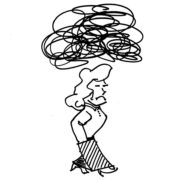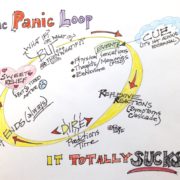Social anxiety disorder (SAD) is being hypersensitive to either real or imagined criticism. What underlies this feeling is an exquisite sensitivity to the feeling of embarrassment.
People with SAD may often feel they are being judged or criticized harshly, and some have trouble with any public performance or social interaction they consider less than perfect. People with SAD often look back on particular social interactions, feeling the need to continually rehash what went wrong with what they said, did, wore, or expressed.
Individuals with SAD may be afraid of physical sensations that are part of their triggers such as a racing heart, shaking hands, dry mouth or blushing. There is a great deal of comparing themselves with others to see how they stack up, and a lot of thei r self worth is derived from what others think, or what they believe others think of them. A casual tossed off opinion can destroy their day and send someone with SAD off into a downward spiral of rumination and self incrimination. They also tend to worry days or weeks before a dreaded situation such as a presentation, exam, or social engagement.
r self worth is derived from what others think, or what they believe others think of them. A casual tossed off opinion can destroy their day and send someone with SAD off into a downward spiral of rumination and self incrimination. They also tend to worry days or weeks before a dreaded situation such as a presentation, exam, or social engagement.
Even going to the grocery store can be a difficult task to overcome when you are wondering if everyone is staring at your latest pimple or whether or not you shop too many times in a week, or even what you put in your cart. In addition, neutral or ambiguous actions by others are often interpreted negatively by the person who suffers from this disorder.
SAD can be limited to just one type of situation or it can affect individuals in many realms. It is not uncommon for SAD to have an early onset at about age 12-13. There are some people with SAD who are shy, but many are not and have excellent social skills, but have concerns with the size of group interactions they face. They may function just fine in small groups or one-on-one, but panic in large classes, meetings, or work related presentations. And often depression will accompany SAD due to self-imposed isolation, poor self esteem, and feelings of worthlessness. Self medicating with alcohol in social situations is a prevalent avoidance behavior used to cope.
It is definitely possible to manage social anxiety disorder by changing the relationship you have with your anxiety. If this is an issue you face, and it is disrupting your life, or keeping you from opportunities you might otherwise choose, seek help to make the changes you desire. You don’t have to fight the wave [of anxiety] or change it in any way; you can learn to observe it, detach, and watch as it passes.











Thanks for helping me understand that going to the grocery store can even be hard for someone with SAD, especially when they feel like people are staring at their latest pimple or else. I have been experiencing extremely negative emotions whenever I go to big events, and I wonder if it is just me being an introvert. But my friends say that it is more than that already, so I should see a professional to get diagnosed and determine if I already need to undergo anxiety therapy sessions.
I find it interesting when you said that even physical sensations can trigger people with social anxiety disorder and can cause them to have a racing heart, shaking hands, dry mouth, or blushing. Personally, I have a problem connecting with people around me, and I have a hard time even hugging my partner at times. I plan to get it checked and see if I will be diagnosed with this condition, and, if I do, I will make sure that I will get proper anxiety treatment as soon as possible. This is to improve myself and my relationship with my loved ones.